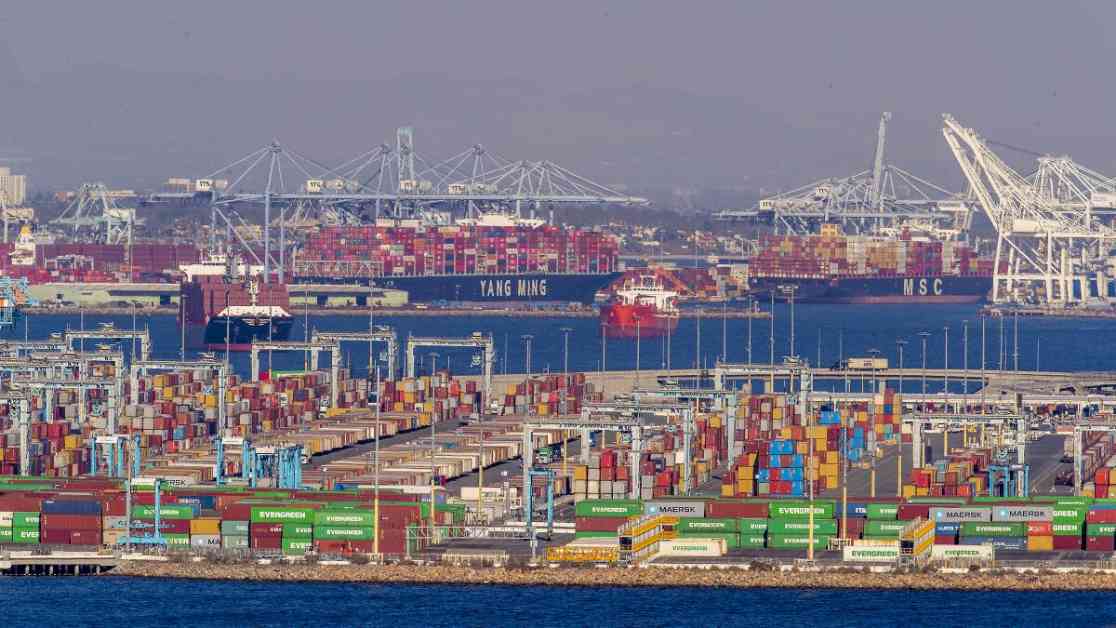Dockworkers’ Strike Impacting California’s Economy
As the threat of a dockworkers’ strike looms on the East and Gulf coasts, the repercussions are already being felt in California. The possibility of a strike as early as Tuesday has led to increased business for the ports of Los Angeles and Long Beach, as shippers divert more products to the West Coast to avoid potential disruptions. While this may benefit the California ports in the short term, it could also have significant consequences for consumers and the economy at large.
A strike by the 47,000-member International Longshoremen’s Assn. could result in billions of dollars in economic damage, as shippers are forced to reroute their products, leading to increased costs, delays, and potential shortages for importers and retailers. These additional costs are likely to be passed on to consumers, who may face difficulties finding popular items on store shelves. The timing of a potential strike is particularly concerning, as it could coincide with peak holiday deliveries, exacerbating the impact on businesses and consumers alike.
Negotiations between the ILA and the United States Maritime Alliance have broken down, leaving the possibility of a strike imminent. The political implications of a strike are also significant, as President Biden and Vice President Harris face a delicate balancing act between supporting the workers and avoiding disruptions to the supply chain. The decision to intervene in the event of a strike could have far-reaching consequences for both the administration and the American public.
Rachel Michelin, president of the California Retailers Assn., emphasized the potential impact of a strike on consumers, noting that retailers have already begun to make contingency plans to mitigate the effects of a potential disruption. The increased volume of cargo being rerouted to the West Coast has put a strain on the ports of Los Angeles and Long Beach, which are already operating near capacity. While efforts are being made to accommodate the additional cargo, there are limits to how much can be handled without incurring additional costs and logistical challenges.
Preparing for Potential Disruptions
Despite the challenges posed by a potential strike, port officials are working to ensure that operations continue smoothly. The Port of Long Beach’s executive director, Mario Cordero, has emphasized the importance of extended operating hours and adequate equipment to handle the increased cargo volume. While there is currently available warehouse space in the Inland Empire region, lessons learned from previous supply chain disruptions have led to improved tracking systems and tools to prevent gridlock.
The surge in cargo volume to the ports of Los Angeles and Long Beach is not solely a result of shippers hedging against a potential strike. Consumer demand has also played a significant role in driving the increased traffic to the West Coast ports. Additionally, factors such as droughts in the Panama Canal and security concerns in the Red Sea have contributed to the uptick in imports to California.
Mike Jacob, president of the Pacific Merchant Shipping Assn., highlighted the resilience of the supply chain following the challenges of the COVID-19 pandemic. Efforts to improve tracking and monitoring systems have helped to reduce the risk of bottlenecks and disruptions, ensuring a smoother flow of goods through the ports of Los Angeles and Long Beach.
The Stakes of a Potential Strike
The implications of a dockworkers’ strike extend beyond the immediate impact on the ports and the supply chain. Harold Daggett, president of the ILA, has signaled the union’s readiness to strike if a satisfactory contract agreement is not reached. The last time the ILA went on strike was in 1977, underscoring the seriousness of the current labor negotiations.
The White House has indicated that it will not intervene to break a potential strike, opting to support collective bargaining between the parties. The political ramifications of a strike could be significant, particularly in swing states like Georgia, where the Port of Savannah is a major economic hub. The potential disruption to the supply chain comes at a time when the economy is recovering from high inflation and the Federal Reserve is adjusting interest rates.
As businesses and consumers brace for the impact of a potential strike, the uncertainty surrounding the labor negotiations underscores the importance of a swift resolution to avoid disruptions to the nation’s economy. The outcome of the negotiations will have far-reaching consequences for the ports, the supply chain, and the broader economy, making it crucial for both parties to reach a compromise that minimizes the impact on businesses and consumers alike.



























